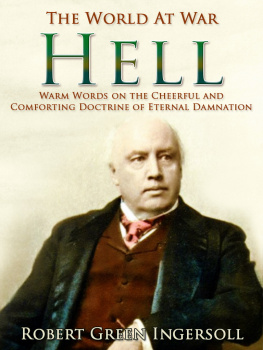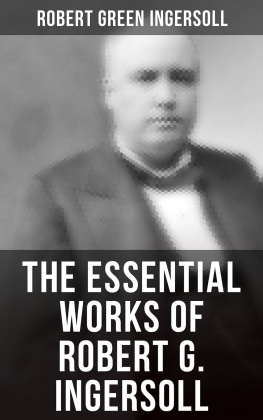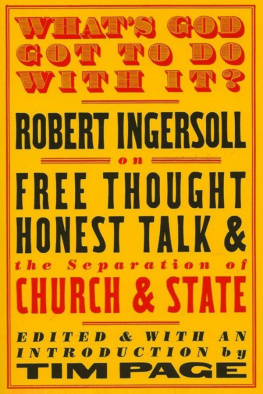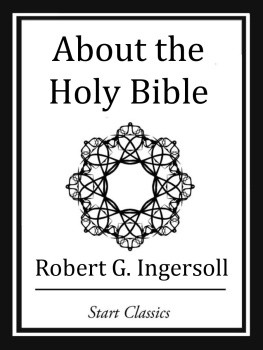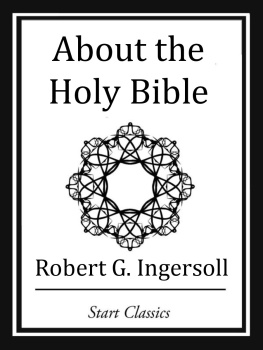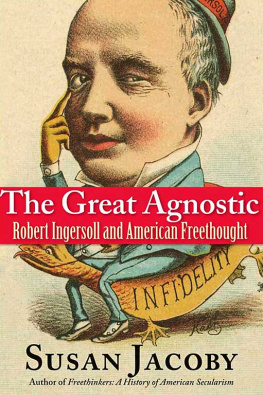HELL
WARM WORDS ON THE CHEERFUL AND COMFORTING DOCTRINE OF ETERNAL DAMNATION FROM COL INGERSOLL'S AMERICAN SECULAR LECTURES
By Col. Robert G. Ingersoll
Minister Of The Gospel Of Free Thought In America
Rev. HENRY WARD BEECHER says:"I admire Ingersoll because he is not afraid to speak what he honestly thinks, and I am only sorry he does not think as I do. I never heard so much brilliancy and pith put into a two hours' Speech as I did on that night. I wish my whole Congregation had been there to hear it. I regard him as one of the greatest Men of the Age."New York Herald.
HELL.
THE idea of a hell was born of revenge and brutality on the one side, and cowardice on the other. In my judgment the American people are too brave, too charitable, too generous, too magnanimous, to believe in the infamous dogma of an eternal hell. I have no respect for any human being who believes in it. I have no respect for any man who preaches it. I have no respect for the man who will pollute the imagination of childhood with that infamous lie. I have no respect for the man who will add to the sorrows of this world with the frightful dogma. I have no respect for any man who endeavours to put that infinite cloud, that infinite shadow, over the heart of humanity.
For a good many years the learned intellects of Christendom have been examining into the religions of other countries in the world, the religions of the thousands that have passed away. They examined into the religions of Egypt, the religion of Greece, the religion of Rome and of the Scandinavian countries. In the presence of the ruins of those religions the learned men of Christendom insisted that those religions were baseless, that they were fraudulent. But they have all passed away. While this was being done the Christianity of our day applauded, and when the learned men got through with the religions of other countries they turned their attention to our religion. By the same mode of reasoning, by the same methods, by the same arguments that they used with the old religions, they were overturning the religion of our day. Why? Every religion in this world is the work of man. Every book has been written by man. Men existed before the books. If books had existed before man, I might admit there was such a thing as a sacred volume. Man never had an ideaman will never have an idea, except those supplied to him by his surroundings. Every idea in the world that man has came to him by nature. You can imagine an animal with the hoof of a bison, with the pouch of the kangaroo, with the wings of an eagle, with the beak of a bird, and with the tail of the lion; and yet every point of this monster you borrowed from nature. Every thing you can think of, every thing you can dream of, is borrowed from your surroundings. And there is nothing on this earth coming from any other sphere whatever. Man has produced every religion in the world. And why? Because each religion bodes forth the knowledge and the belief of the people at the time it was made, and in no book is there any knowledge found, except that of the people who wrote it. In no book is there found any knowledge, except that of the time in which it was written. Barbarians have produced, and always will produce barbarian religions; barbarians have produced and always will produce ideas in harmony with their surroundings, and all the religions of the past were produced by barbarians. We are making religions to-day. That is to-say, we are changing them, and the religion of to-day is not the religion of one year ago. What changed it? Science has done it; education and the growing heart of man has done it. And just to the extent that we become civilized ourselves, will we improve the religion of our fathers. If the religion of one hundred years ago, compared with the religion of to-day is so low, what will it be in one thousand years?
If we continue making the inroads upon orthodoxy which we have been making during the last twenty-five years, what will it be fifty years from to-night? It will have to be remonetized by that time, or else it will not be legal tender. In my judgment, every religion that stands by appealing to miracles is dishonoured Every religion in the world has denounced every other religion as a fraud. That proves to me that they all tell the truthabout others. Why? suppose Mr. Smith should tell Mr. Brown that heSmithsaw a corpse get out of the grave, and that when he first saw it, it was covered with the worms of death, and that in his presence it was re-clothed in healthy, beautiful flesh. And then suppose Mr. Brown should tell Mr. Smith, "I saw the same thing myself. I was in a graveyard once, and I saw a dead man rise." Suppose then that Smith should say to Brown, "You're a liar," and Brown should reply to Smith, "And you're a liar," what would you think? It would simply be because Smith, never having seen it himself, didn't believe Brown; and Brown, never having seen it, didn't believe Smith had. Now, if Smith had really seen it, and Brown told him he had seen it too, then Smith would regard it as a corroboration of his story, and he would regard Brown as one of his principal witnesses. But, on the contrary, he says, "You never saw it." So when a man says, "I was upon Mount Sinai, and there I met God, and he told me, 'Stand aside and let me drown these people; '" and another man says to him, "I was up upon a mountain, and there I met the Supreme Brahma," and Moses says, "That's not true," and contends that the other man never did see Brahma, and he contends that Moses never did see God, that is in my judgment proof that they both speak truly.
Every religion, then, has charged every other religion with having been an unmitigated fraud; and yet, if any man had ever seen the miracle himself, his mind would be prepared to believe that another man had seen the same thing. Whenever a man appeals to a miracle he tells-what is not true. Truth relies upon reason, and the undeviating course of all the laws of nature.
Now, we have a religionthat is, some people have. I do not pretend to have religion myself. I believe in living for this worldthat's my doctrineto make everybody happy that you can. Let the future take care of itself, and if I ever touch the shores of another world, I will be just as ready and anxious to get into some remunerative employment as anybody else. Now, we have got in this country a religion which men have preached for about eighteen hundred years, and just in proportion as their belief in that religion has grown great, men have grown mean and wicked; just in proportion as they have ceased to believe it, men have become just and charitable. And if they believed it to-night as they once believed it, I wouldn't be allowed to speak in the city of New York. It is from the coldness and infidelity of the churches that I get my right to preach; and I say it to their credit. Now we have a religion. What is it? They say in the first place that all this vast universe was created by a Deity. I don't know whether it was or not. They say, too, that had it not been for the first sin of Adam there would never have been any devil in this world, and if there had been no devil there would have been no sin, and if there had been no sin there never would have been any death. For my part I am glad there was death in this world, because that gave me a chance. Somebody had to die to give me room, and when my turn comes I'll be willing to let somebody else take my place. But whether there is another life or not, if there is duty being who gave me this, I shall thank him from the bottom of my heart, because, upon the whole, my life has been a joy. Now they say, because of this first sin all man was consigned to eternal hell. And this because Adam was our representative. Well, I always had an idea that my representative ought to live somewhere about the same time I do. I always had an idea that I should have some voice in choosing my representative. And if I had a voice I never should have voted for the old gentleman called Adam. Now in order to regain man from the frightful hell of eternity, Christ himself came to this world and took upon himself flesh, and in order that we might know the road to eternal salvation he gave us a book, and that book is called the Bible, and wherever that Bible has been read men have immediately commenced cutting each others' throats. Wherever that Bible has been circulated, they have invented inquisitions and instruments of torture, and have commenced hating each other with all their hearts. But I am told now, we are all told, that this Bible is the foundation of civilization; I say that this Bible is the foundation of hell, and we never shall get rid of the dogma of hell until we get rid of the idea that it is an inspired book.

